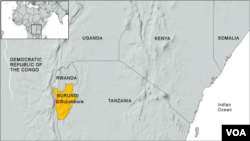The International Monetary Fund said Wednesday that it would lend Burundi $6.9 million to shore up the aid-dependent central African nation, months before a presidential election in June.
Tensions are running high in the landlocked nation, which is tentatively emerging from more than a decade of civil war, because of a dispute over whether current President Pierre Nkurunziza can run for another term in a vote on June 26.
The IMF also said it would lend Burundi $13.9 million in 2016 to "help strengthen the management of public finances and consolidate the country's economic reform program."
The funds are part of IMF's Extended Credit Facility regime, a financial support program for low-income countries that carries a zero interest rate. Burundi has received about $41.6 million through the program over the last three years.
"The near-term economic outlook remains challenging, and prudent policies will continue to be needed in the face of uncertainties in the external environment, and in the run-up to the 2015 national elections," Mitsuhiro Furusawa, acting chair of the IMF's executive board, said in a statement.
Just under half of Burundi's planned 1.5 trillion franc ($966 million) budget for 2015 will be funded by international donors, according to a plan approved by parliament last year.
With a population of about 10 million, Burundi faces its worst political crisis since emerging from a 12-year civil war in 2005. Neighbors and Western donors fear the problems could spark more unrest in a volatile region of the continent.
Regional leaders and senior officials in Burundi's ruling party have urged Nkurunziza to abandon his quest for a third term to avoid renewed violence, but so far there is no indication he will step aside.
The IMF said Burundi's economic growth picked up slightly in 2014, while inflation fell "markedly," thanks to falling global fuel and food prices and the country's sound monetary policy.
Burundi's annualized inflation rate dropped sharply to 1.2 percent in February from 3.5 percent in January, helped by lower costs for housing, water and electricity.
The IMF said Burundi should focus on strengthening its tax administration, raising agricultural productivity, alleviating infrastructure bottlenecks, expanding credit access and deepening regional integration. The global lender also urged Burundi to borrow on concessional terms in the future.





